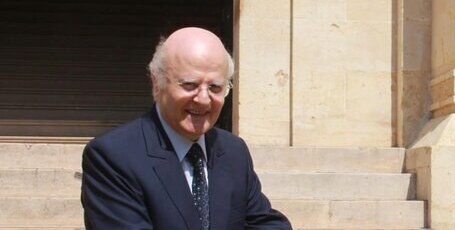
By NAJIA HOUSSARI — arabnews.com — BEIRUT: Jean Obeid, the veteran Lebanese MP and former journalist who twice ran for the presidency, died on Monday from complications related to COVID-19. He was 81. Obeid, born in the village of Alma in northern Lebanon, was minister of education, youth, sports, and foreign affairs in the governments of Rafik Hariri. In 1987, during the civil war, he was abducted by gunmen in West Beirut and released unharmed after four days. A member of a prominent Maronite family, Obeid had a successful career as a journalist before entering politics. He was an MP from 1991 until 2005, and returned to parliament in 2018 when he won a seat representing Tripoli. Lebanon began gradually relaxing its three-week virus lockdown on Monday despite a high number of COVID-19 cases.
The Ministry of Health recorded 54 deaths and 2,081 new COVID-19 cases on Sunday, bringing the cumulative death toll to 3,616 and the total number of cases to 319,917 since Feb. 21, 2020. Arab News obtained a report by the Crisis Observatory at the American University of Beirut (AUB) referring to three alarming indicators that suggest a new wave of COVID-19 is underway. According to the report, positive polymerase chain reaction (PCR) tests reached 22 percent during the past two weeks, the highest rate in the world. The World Health Organization (WHO) advises against the return to normality or semi-normality before this percentage drops to 5 percent or below.
The report also highlighted that “the number of people registered on the vaccination platform is low, with only 248,000 people registered, in addition to 70,000 health care professionals and workers. This means that the vaccination so far will include 6.5 percent of the total population, provided that the total population is 4,842,000, according to the Central Administration of Statistics (CAS). “This is a very low percentage compared to the desired goal to reach community immunity, which is estimated at 75-80 percent of the population,”it added. The observatory pointed out that “the Ministry of Social Affairs’ national program to support the poorest families has received a high number of applicants who require assistance. The program received 370,000 applicants within two weeks of opening applications. This number accounts for 37 percent of Lebanese families, an indication of deteriorating living conditions, which means closure measures not accompanied by financial support for these families will not succeed.”
Meanwhile, Dr. Firas Al-Abyad, director of the Hariri Governmental University Hospital, announced the passing of a one-year-old baby girl “as a result of complications from the (coronavirus) disease that her parents contracted,” the first death of its kind in Lebanon. Three other children had previously died of COVID-19 as they were suffering from dserious underlying conditions, but the death of the otherwise healthy toddler at Hariri Hospital is a previously unseen development. Al-Abyad confirmed that “the toddler did not suffer from any chronic diseases but was in good health and arrived at the hospital suffering from difficulty breathing as a result of pneumonia.” He added: “Lebanon’s policy of mitigating impacts, that is, coexisting with the infection, did not yield the desired results. Instead, it increased the death toll and worsened the economic decline.” Protests were held on Sunday night in Beirut and a number of other regions. Protesters blocked roads and burned tires to pressure the government to relax lockdown measures and take into account the living conditions imposed on people already suffering an unprecedented economic crisis, leading to mass bankruptcy and hunger.
The Ain Al-Hilweh Palestinian refugee camp, meanwhile, has seen an outbreak of COVID-19 after violations of lockdown measures, including a wedding party. On Sunday night, several ambulances were seen transporting people from the camp to hospitals in nearby Sidon. The head of UNRWA’s health department in Lebanon, Dr. Abdel Hakim Shana’a, said: “The number of active cases in Ain Al-Hilweh camp has reached 146, while there are 103 cases in the Palestinian communities adjacent to the camp. The daily rate of infections in all camps ranges between 30 and 50 cases.” Shana’a stressed that “Palestinian refugees are responsible in the first place for protecting themselves from the infection, and we have always warned that (social) mixing and participating in funerals, weddings, and all forms of gatherings are dangerous.”
The Crisis Observatory at the AUB warned that “we are facing a dilemma, and overcoming it requires expanding the hospitals’ capacity even if the authorities have to activate the general mobilization system and exert all efforts to accelerate the launch of the national vaccination plan. “Otherwise, the virus’s spread will be prolonged, and reopening businesses, markets, and service and social institutions will be delayed.”



